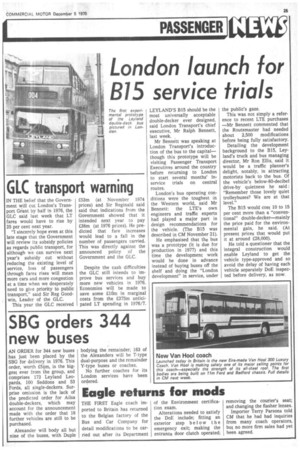London launch for 1315 service trials
Page 27

If you've noticed an error in this article please click here to report it so we can fix it.
LEYLAND'S B15 should be the most universally acceptable double-decker ever designed, said London Transport's chief executive, Mr Ralph Bennett, last week.
Mr Bennett was speaking at London Transport's introduction of the bus to the capital— though this prototype will be visiting Passenger Transport Executives around the country before returning to London to start several months' inservice trials on central routes.
London's bus operating conditions were the toughest in the Western world, said Mr Bennett: the LTE's own engineers and traffic experts had played a major part in design recommendations for the vehicle. (The B15 was described in CM November 21).
He emphasised that the bus was a prototype (it is due for production in 1977) and this time the development work would be done in advance instead of buying buses off the shelf and doing the "London development" in service, under the public's gaze.
This was not simply a reference to recent LTE purchases —Mr Bennett commented that the Routemaster had needed about 2,500 modifications before being fully satisfactory.
Detailing the development background to the B15, Leyland's truck and bus managing director, Mr Ron Ellis, said it would be a traffic planner's delight, notably, in attracting motorists back to the bus. Of the vehicle's below-80-decibel drive-by quietness he said : "Remember those lovely quiet trolleybuses? We are at that level."
The B15 would cost 10 to 15 per cent more than a "conventional" double-decker—mainly the price paid for the environmental gain, he said. (At present prices that would put it at around £28,000).
He told a questioner that the integral construction would enable Leyland to get the vehicle type-approved and so avoid the delay of having each vehicle separately DoE inspected before delivery, as now.


































































































































